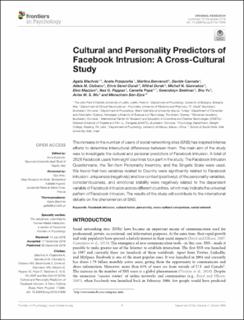| dc.contributor.author | Błachnio, Agata | |
| dc.contributor.author | Przepiorka, Aneta | |
| dc.contributor.author | Benvenuti, Martina | |
| dc.contributor.author | Cannata, Davide | |
| dc.contributor.author | Ciobanu, Adela Magdalena | |
| dc.contributor.author | Senol-Durak, Emre | |
| dc.contributor.author | Durak, Mithat | |
| dc.contributor.author | Giannakos, Michail | |
| dc.contributor.author | Mazzoni, Elvis | |
| dc.contributor.author | Pappas, Ilias | |
| dc.contributor.author | Popa, Camelia | |
| dc.contributor.author | Seidman, Gwendolyn | |
| dc.contributor.author | Yu, Shu | |
| dc.contributor.author | Wu, Anise M.S. | |
| dc.contributor.author | Ben-Ezra, Menachem | |
| dc.date.accessioned | 2020-04-27T13:01:25Z | |
| dc.date.available | 2020-04-27T13:01:25Z | |
| dc.date.created | 2016-12-14T14:07:40Z | |
| dc.date.issued | 2016 | |
| dc.identifier.citation | Frontiers in Psychology. 2016, 7 (1895), 1-9. | en_US |
| dc.identifier.issn | 1664-1078 | |
| dc.identifier.uri | https://hdl.handle.net/11250/2652664 | |
| dc.description.abstract | The increase in the number of users of social networking sites (SNS) has inspired intense efforts to determine intercultural differences between them. The main aim of the study was to investigate the cultural and personal predictors of Facebook intrusion. A total of 2628 Facebook users from eight countries took part in the study. The Facebook Intrusion Questionnaire, the Ten-Item Personality Inventory, and the Singelis Scale were used. We found that two variables related to Country were significantly related to Facebook intrusion: uniqueness (negatively) and low context (positively); of the personality variables, conscientiousness, and emotional stability were negatively related to the dependent variable of Facebook intrusion across different countries, which may indicate the universal pattern of Facebook intrusion. The results of the study will contribute to the international debate on the phenomenon of SNS. | en_US |
| dc.language.iso | eng | en_US |
| dc.publisher | Frontiers Media | en_US |
| dc.rights | Navngivelse 4.0 Internasjonal | * |
| dc.rights.uri | http://creativecommons.org/licenses/by/4.0/deed.no | * |
| dc.title | Cultural and Personality Predictors of Facebook Intrusion: A Cross-Cultural Study | en_US |
| dc.type | Peer reviewed | en_US |
| dc.type | Journal article | en_US |
| dc.description.version | publishedVersion | en_US |
| dc.source.pagenumber | 1-9 | en_US |
| dc.source.volume | 7 | en_US |
| dc.source.journal | Frontiers in Psychology | en_US |
| dc.source.issue | 1895 | en_US |
| dc.identifier.doi | 10.3389/fpsyg.2016.01895 | |
| dc.identifier.cristin | 1412758 | |
| dc.description.localcode | Copyright © 2016 Błachnio, Przepiorka, Benvenuti, Cannata, Ciobanu, Senol-Durak, Durak, Giannakos, Mazzoni, Pappas, Popa, Seidman, Yu, Wu and Ben-Ezra. This is an open-access article distributed under the terms of the Creative Commons Attribution License (CC BY). The use, distribution or reproduction in other forums is permitted, provided the original author(s) or licensor are credited and that the original publication in this journal is cited, in accordance with accepted academic practice. No use, distribution or reproduction is permitted which does not comply with these terms. | en_US |
| cristin.ispublished | true | |
| cristin.fulltext | original | |
| cristin.qualitycode | 2 | |

